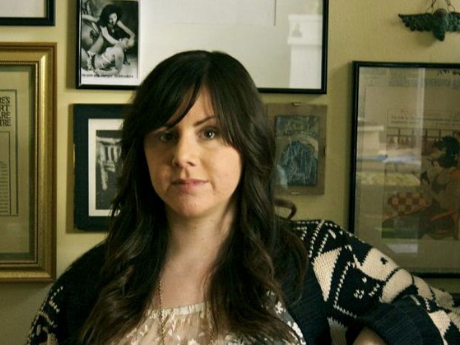In Their Own Words
Sara Mumolo's "The Called Back Wreck of Things"

The Called Back Wreck of Things
Our world could not be more up-to-the-minute
I would've put it on mouth as mouth: see sound whole
The clock exhausts its knocking decision
A finger's echo on my chest after the cough chimes down
The stakes, airier than scared to material
Lesion struck moon, impossible to sight or arouse
Sunbathers leisure out, cloaked
My incessant need to tear static without know what is
Next the predatory fin floats without floating
We fumble to get our hands in place
Even the victim's stroke, a truck packed with color
I can't help but watch my bodies leap from the chariot
Every seat in the odd upkeep and joust
Move over now for what is obsolete
Shaky hearse of rehearsed preoccupations
A bag's imprint across my breast
Acknowledges that place we flee spoils
What each territory demands
All that crap in my chest
Abides the unattended rotunda at my hips
Veneer over vision baiting
The fooled precession our world is
Or, we enter identity lugging risks
That we are not reentering it
Snakes are disgusting I think
About the white flowers as negatives of
The running woman's blank eye-sockets
From Mortar (Omnidawn, 2013). Reprinted with the permission of the author.
On "The Called Back Wreck of Things"
I wrote the first draft of this poem in a third floor studio apartment in Mexico City. An aging architect owned the building, and his office stood adjacent to the three-story home, an office comprised of glass. His own Philip Johnson's glass house.
The poem still makes me feel hot and sweaty like riding the Metro in D.F. Each Metro line has a logo for its name because at the time of its opening the illiteracy rate was very high, and some people were better able to guide themselves with a system based on colors and visual signs. Maybe the poem is based on similar strategies; I'm looking to delimit the poem, to reach further than the page. In other words, to reach beyond the page doesn't mean to disappear into abstraction or unmeaning, but at some point the poem is a mood, an echo that allows someone to forget for a few lines that they are reading a poem. They're in the poem. When I'm reading a poem that I love I forget that I am reading it: I experience it.
The last couplet of the poem came from a collaborative issue of Slope 27. "The Called Back Wreck of Things" is probably my favorite poem in the book, and the energy of those poet-friend-collaborators lives in that couplet: Lines that aptly capture the street.
* * *
Note: Italics from Barbara Guest's essay "Wounded Joy"


